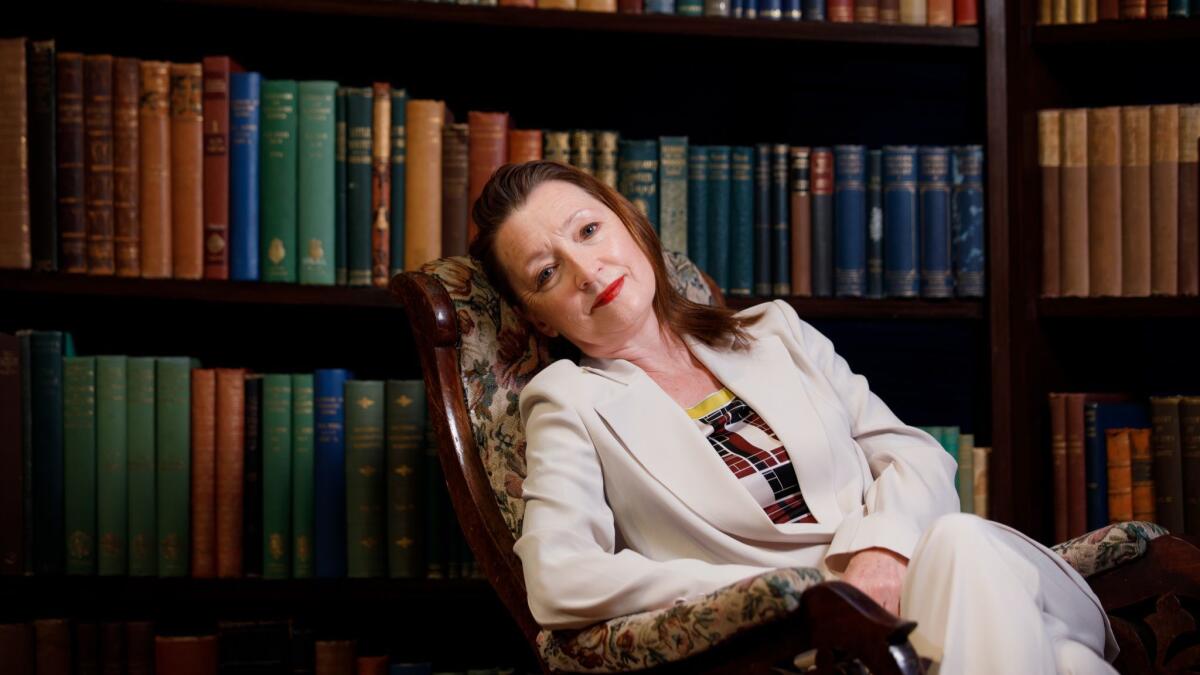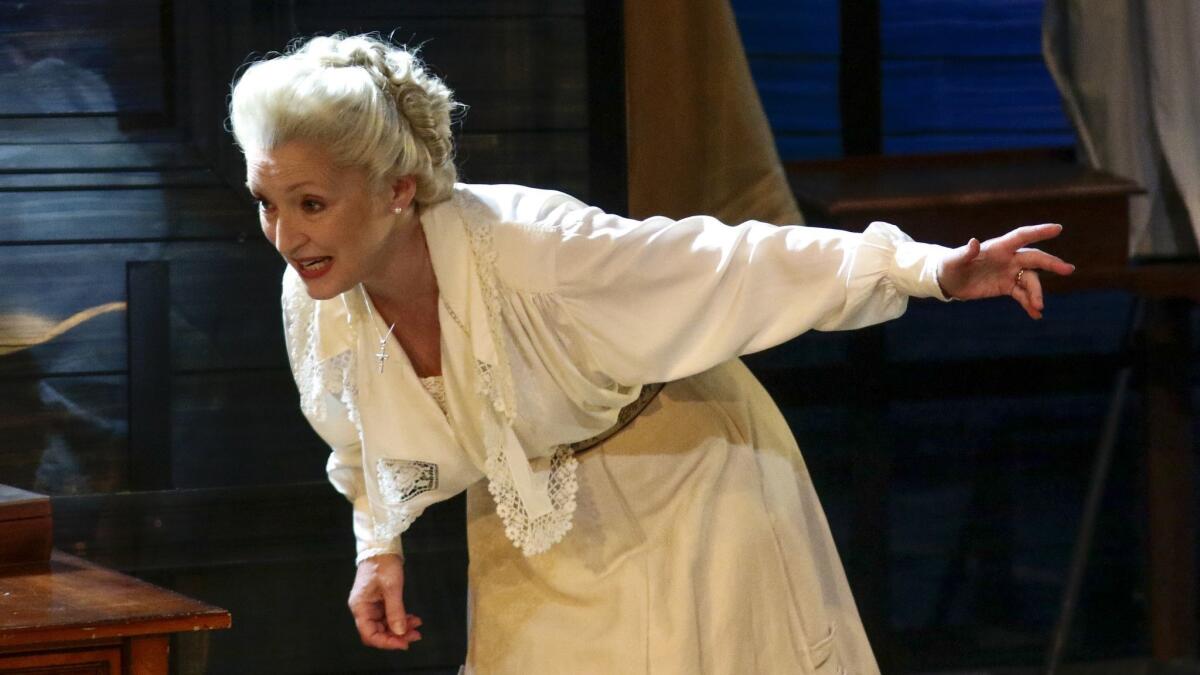Sunday Conversation: Lesley Manville discusses her wide-ranging career and new appreciation for TV

- Share via
British actress Lesley Manville made a vow in her 20s to never to be typecast, no matter the consequences. She stuck to that promise for four decades and has the résumé to prove it.
In the past year, Manville landed her first Oscar nomination for her supporting role as the no-nonsense sister in “Phantom Thread” and garnered critical kudos as the coldblooded brothel proprietor of Hulu’s series “Harlots” and the ghostlike morphine addict Mary in a stage revival of “Long Day’s Journey Into Night” that played in London, New York and Beverly Hills.
Now with the Season 2 return of “Harlots” on July 11, Manville resumes her role as the cutthroat businesswoman Lydia Quigley, a formidable player in 18th century London’s booming prostitution trade. Replete with an ice-white wig and even icier stare, Quigley is just one of many characters Manville will inhabit this year. She’s also the selfless protagonist of the British family sitcom “Mum,” a scatter-minded pixie in Disney’s forthcoming “Maleficent 2” and was recently cast as Salvador Dalí’s other half, Gala, for a feature film costarring Ben Kingsley
.During her final week of “Long Day’s Journey” in L.A., Manville, 62, spoke with The Times backstage at the Wallis Annenberg Center about her life in theater, her changing relationship with television and why fame is better with age.
I read that you were once hesitant about taking on television roles. Is that true?
I was. Television is in such a wonderful place now, but that wasn’t always the case. You had to pick and choose very carefully. I’ve always done that with all the projects but with television especially because you could really get burned. It could really do a lot of damage to your career. Yes, it was probably the biggest audience you’d get, certainly bigger than my plays, but there were risks.
You’ve gradually done more and more TV productions, including the BBC period miniseries “Cranford,” “Harlots” and “Mum.” What changed?
TV is such a different place than it was. Writers started decamping and going to television, we’re talking like 15 years ago or more, because they couldn’t get films off the ground. Writing film scripts is very hard and it’s hard to get them made. So a lot of the great writers started going to HBO and getting TV series made, so the standard of writing now is really elevated. Television is now a feast of good writing, great acting and great directors.
“Harlots” came out around the same time as Hulu’s “The Handmaid’s Tale.” Both are dramas by women, starring women ...
… and I see them as complementing one another.
Because they both tackle female oppression in different ways?
Yes. With “Harlots,” it’s set in 1763, when one in five women in London were prostitutes. That’s a staggering statistic. But there were few other options. They couldn’t say, ‘I’m going to be a doctor or a lawyer.’ A lot of them were doing it for reasons of independence, so they wouldn’t have to be in a hideous arranged marriage. You either got married and had children or did menial jobs and starved.
Prostitution looks so much different on screen when it’s depicted from a woman’s perspective. It’s business transaction, and the real drama in the show is how these women run their businesses — and treat one another.
In “Harlots” people are having sex in the streets, in carriages, or in a house like Lydia’s where she’s supplying clean, beautifully dressed girls in elaborate surroundings to men of high standing — politicians, barons, royalty. But [it’s] about women who were trying not be trapped. It looks at their limited options of being autonomous.
Was that dynamic part of what attracted you to “Harlots”?
Honestly it was the script. If you read a bad script it doesn’t matter if it’s a female-led piece, with women all over the place; if it’s bad, it’s bad. You’re not going to want to do it. But Moira Buffini’s work as a writer sucked me in. She’s the series creator and she’s written lots of the episodes. I also met Coky Giedroyc, who directed the first three episodes of Season 1 and 2, and she’s the kind of overseeing director. They didn’t have a whole lot of episodes to show me, but the script was enough. And I could see that with Samantha Morton and me and Jessica Brown Findlay at the helm of this — both actresses whose work I’d admired — this could be really good. The ingredients were all there.
Lydia is such a wonderfully wicked, scary character. She couldn’t be more different than Cathy of “Mum.”
Cathy’s the protagonist, a mum who’s sweet and gentle and kind and giving and good. She’s the exact opposite of Lydia, which makes my life as an actor more interesting. And Dorothy Atkinson, who is in “Harlots,” is also in “Mum.” Our roles are kind of reversed. In “Harlots” she plays the Bible-bashing Florence. In “Mum” she plays the horrible, snobby, vile girlfriend of my brother. So when in “Harlots” I’m horrible to her, we call it Cathy’s revenge.
Were you working on “Phantom Thread” and “Harlots” simultaneously?
I was shooting “Phantom Thread” and was committed to do “Harlots” when the [British production of ‘Long Day’s Journey Into Night’] came in. I thought, ‘I’m not going to lose this.’ So on the days when “Harlots” filmed, they’d release me by 4 o’clock and I go do the play. My agent said, ‘You’re mad!’ But I was not going to lose that play. I was getting to bed at 12 and up at 5. But I did it. I’m here still.
You’ve done a lot of period roles. How much did you know beforehand about the London era that “Harlots” is set in?
Not a lot. It was fascinating because one of the ideas for [the series] came from a book that was made called “Harris’s List of Covent Garden Ladies.” It’s a real book that was produced back in the day by a guy who ran a pub in London. He wrote, like, a little directory of prostitutes, rating them, like, ‘Lucy who lives on Whatever Street at No.9, she’ll do this but she won’t do that. She’s got big breasts, she’s saucy, etc.’ It was based on his own experience or other men’s who added to the book. The book grew as it was added to. It’s a hilarious story.

You’ve done dozens of films, including many with director Mike Leigh, but would you say theater has been your mainstay?
Yes, but there’s been huge periods when I haven’t done theater. I did a lot in my 20s and 30s because that’s what you did back then. You didn’t come to the States for pilot season. You didn’t come here to try and get film work. Occasionally some actors got American films, but it didn’t really happen often. I worked at the National Theatre, the Royal Shakespeare Company, the Royal Court. But there was a time in my late 30s and into my 40s when I actually didn’t do a play for 10 years. I had a young child, so it was hard to commit that much time or be away for extended periods of time. I worked with Mike Leigh and cherry-picked for other good film and television.
There’s also something about cutting one’s teeth outside the world of celebrity-obsessed Hollywood that lends itself to a different sort of creative arc.
I was doing plenty of theater, and I was happy to play smaller roles even when I was getting bigger parts. Like at the Royal Court when I first met Gary Oldman [the two were married for 13 years], we did a double bill of two Edward Bond plays; we had small parts in “The Pope’s Wedding” but leads in “Saved.” We were young and learning and weren’t famous. They were halcyon days. And I worked with some of the greatest directors in the world: Danny Boyle, Sam Mendes, Nick Hytner, Howard Davies, Max Stafford-Clark and Marianne Elliott.
And you had a chance to hone your skills pre-social media, without every mistake being posted on YouTube.
I would not want to be in my 20s now starting in this business. I feel so sorry for the young actors now. They’re kind of force-fed that the most important thing is to be famous, to tweet and Instagram all the time. There’s no mystery about them anymore. I want to say, ‘Look, if your public know everything about you — what you eat, who you’re with — there’s no use trying to make them believe [in a character] you’re playing.’
Do you think coming up in the theater made you a better actor?
There’s no doubt about it that you learn most about acting through the theater because you’re really on your own. You cannot be edited and made to look better in the edit. You’re exposed. The audience can look wherever they want. It’s up to you to make them pay attention.
Are there other things you’re working on now that you can talk about?
Yes. I’m going to Belfast to do a gorgeous, delicate film with Liam Neeson called “Normal People.” And I’m doing a quick stint on “Maleficent 2” because, well, I’m one of the pixies. I’m doing the third and final series of “Mum.” And then I think it’s OK to say I’m doing a film with director Mary Harron and Ben Kingsley. We’re playing Salvador and Gala Dalí. So there you go. That’ll take me through Christmas.
So no sleep between now and the new year is what you’re saying?
Listen, I couldn’t be happier. I’m so lucky to be my age and be where I am. I’ve had an amazing career for over 40 years, but it’s definitely taken a shift since “Phantom Thread.” It’s opened up America and American films for me. I don’t think I’d be doing the film with Liam or the film about the Dalís if I hadn’t have done it and got an Oscar nomination. A whole new world has opened up … it’s remarkable at my age.
Do you wish this had happened even a little earlier?
Well, I wouldn’t have wanted to have been famous in my 30s or 20s because it’s so hard to maintain that. And there’s something about getting older that people have trouble with. But on this side of the Atlantic, they haven’t really seen me as young and getting older. If they had, maybe they wouldn’t like me now. I have no Botox or face-lifts. I look how I look. I’m certainly not going to start changing it now.
More to Read
The complete guide to home viewing
Get Screen Gab for everything about the TV shows and streaming movies everyone’s talking about.
You may occasionally receive promotional content from the Los Angeles Times.







